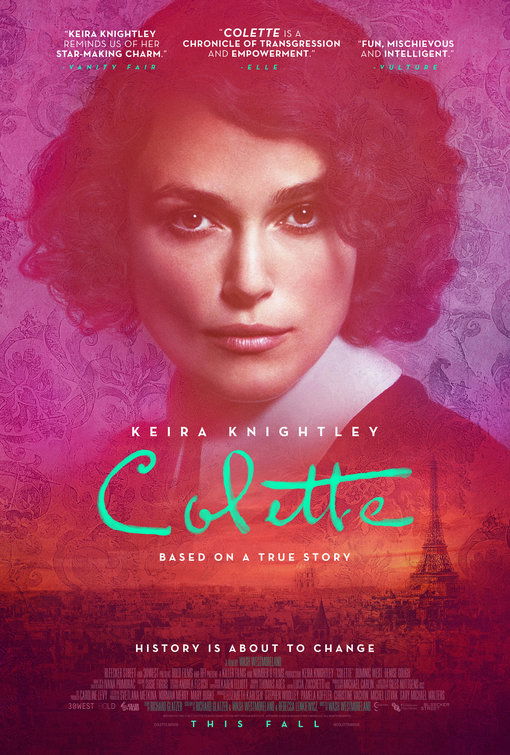“Abhorrent, Slow-Moving Promotion of a Libertine Lifestyle”

| None | Light | Moderate | Heavy | |
|---|---|---|---|---|
| Language | ||||
| Violence | ||||
| Sex | ||||
| Nudity |
What You Need To Know:
COLETTE the movie contains a wonderful score, beautiful costumes, excellent performances, and a style that captures the era in which it’s set. However, it’s extremely slow and often uncomfortable to watch. It also has a strong Romantic, politically correct, feminist, immoral, libertine worldview with many lewd bedroom scenes and homosexual elements. So, COLETTE is an abhorrent movie with little or no redemptive qualities.
Content:
Very strong Romantic, feminist, politically correct worldview with very strong immoral behavior, including very strong homosexual/transgender content, set at the turn of the 20th Century, depicts the lifestyle of those who live outside the bounds of any law morally, including all decisions made by the characters are based on their emotions and pursuit of pleasure, the vows of marriage are violated, boundaries of sex and gender are completely disregarded, and the characters worship themselves, their feelings, and their art, plus some strong but amoral capitalist elements;
Nine obscenities and six strong profanities, title character’s husband crudely passes gas and crudely mentions urination;
No violence;
Many depicted and implied sex scenes (both heterosexual and lesbian), title character and her first husband share the same sex partner, sounds of sexual activity, some sex between man and his wife, the Eiffel Tower is referred to as a giant erection, it’s implied that title character and her first husband have been sneaking around behind her parents and sleeping together before they married, and many references to women as queens of desire and literature as a tool for “sexual quagmire”;
Images of upper female nudity, upper male nudity when three shirtless men sand a wooden floor, title character’s dress gets purposefully torn during a performance to reveal one side of her breasts, and title character dances on stage with a thin skirt and bedazzled bra;
Many scenes feature casual drinking at parties or celebrations, two of those scenes depict drunken behavior through exaggerated celebration and volume of voice, and one scene shows title character’s first husband coming home drunk as shown by his semi-slurred words, physical exhaustion, and red face;
No smoking or drugs; and,
Very strong miscellaneous immorality such as gambling is referred to many times though not depicted, title character’s first husband constantly lies to her about where he’s going and who he’s seeing, divorce is suggested by title character’s mother who thinks her husband is holding her back, title character’s husband manipulates her into writing for him, he’s dishonest about the true author of wife’s first four novels based on a single character, husband consistently overspends and can’t pay back monetary advances given to him and can’t pay his workers at times, and a famous cabaret in Paris offers some scandalous performances for its diverse customers.
More Detail:
Coming close to bankruptcy and unable to pay his own writers, Willy urges Colette to write a novel. Having been educated in a country school outside of Paris, Colette bases her first piece of writing off that education, and the friends and experiences she had there. “Claudine a l’Ecole” (CLAUDINE AT SCHOOL) is published under her husband’s name and becomes widely renown due to its literary and sensuous elegance.
As Willy and Colette’s marriage disintegrates, due to Willy’s own affairs, the movie reveals Colette’s awakening passion for not only writing, but also her relationships with women and a love of the Parisian underworld, theater and the infamous cabaret called Moulin Rouge, the Red Windmill.
Based on a true story, COLETTE seeks to answer one question “Who is the title character?” Starting as a simple country girl in love with a Parisian artist, the audience watches Colette transform as she adapts to a husband she barely knows and the decadent 20th century lifestyle in France where everything goes. Knightly portrays this bildungsroman through a subtle increase in a more masculine wardrobe and hairstyle and progressively amoral behavior and convictions, as well as the increasing sensuality of the novels she’s writing and the decadent lifestyle she’s blatantly living.
The music, costumes, set design, and attention to historical detail in COLETTE are phenomenal. As usual, Keira Knightley delivers an excellent performance and portrayal of the title role, along with a superb performance by Dominic West as the wayward husband. The movie captures what Paris must have been like during the turn of the last century in its decadence and disregard for moral standards.
However, those are the only things that can be praised about this movie. For example, COLETTE has an abhorrent and unnecessary amount of sex scenes between both men and women, as well as women and women. Consequently, the entire plot feels as though it was merely a means to have pornography on the big screen, which only communicates poor writing. The movie was uncomfortable to sit through as well as slow moving.
Though set more than 100 years ago, COLETTE truly fits today’s culture. It praises infidelity between a man and wife. It normalizes homosexual, transgender and radical feminist behavior. It also justifies feelings over wisdom, as well as self over others, and it will be a rallying cry for amoral behavior.
Willy is caught cheating on his wife early in the movie, causing his wife to thoroughly rethink marriage and her expectations. Encouraging Colette’s need for self-discovery, her mother turns to her and says, “No one can take away who you are. You’re too strong for that. Trust yourself and no one else.” Afterwards, Colette says, “I must get used to marriage,” but mother in turn says, “Better get marriage used to you.” Colette, having given up on her traditional expectations of marriage, decides along with Willy to pursue non-traditional routes. Both of them agree they can have relationships with other people, so long as they are honest about it. However, Willy doesn’t want Colette to have any relationships with men. This leads to several affairs with women on Colette’s part. One of those women was simultaneously her lover as well as her husband’s. In turn, the latter relationship is used as a fuel for Colette and Willy’s second novel.
Ultimately, honesty of their affairs is a justification for infidelity on both their parts. Willy’s decisions are always centered around what would be best for him rather than his wife. Her decisions are based on finding who she is. Also, their relationship eventually is based on a business contract, which Colette writes for him while he gets the credit and brings in the finances. It goes on and on and on.
Though some moviegoers may be a fan of historical fiction, Paris or Keira Knightley, COLETTE is an abhorrent movie with little or no redemptive qualities. Moviegoers with any moral standards and any media wisdom will want to avoid COLETTE.


 - Content:
- Content: 

